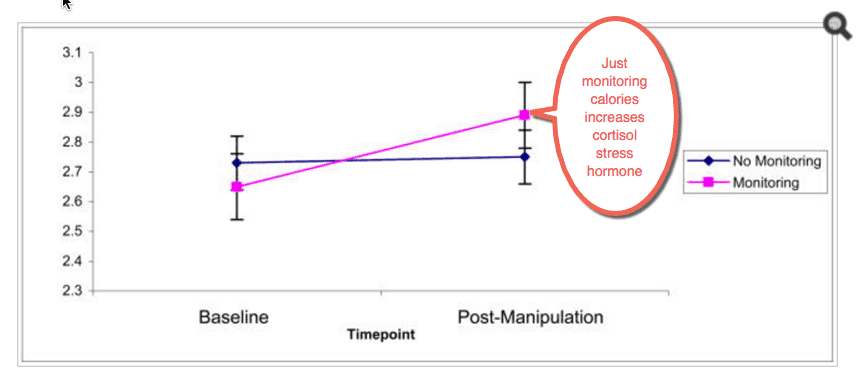
The problem with dieting is, the more you do it, the less it works.
I’m especially talking about two types of dieting.
One type is low-calorie diet. Where you restrict your calories and hope that you lose fat by burning more calories than your eating, then you’re taking in.
The second type of dieting I’m talking about is low-carb dieting, where you attempt to trick the body by restricting carbohydrates so that you’ll burn more fat.
The problem with both of these types of diets is that they do not work except in the very short run.
There is a bounce back effect, so when you stop, you actually gain more weight and more fat than you had before.
What’s wrong with low-carb diets
Low-carb diet specifically lowers your carbohydrate consumption, but the problem is your body releases cortisol.
The effects of cortisol are to raise your blood sugar, and also to turn your proteins into sugar. Your body will not do without sugar.
So if you are not consuming carbohydrates or sugar, your body will make sugar from your organs, your muscles, and even your heart.
This process is called gluconeogenesis and is responsible for your losing lean mass when you do low-carb dieting. You lose organ mass, you lose muscle mass, even heart mass. You may never get this back.
It is one of the many reasons low-carb dieting is very harmful.
What’s wrong with low-calorie dieting
In low-calorie diets, you limit your calorie consumption, so your body does in fact metabolize and burn some of the stored fat and you “lose weight.”
But your body will also metabolize lean mass, such as muscle mass, and organ mass.
Again, the culprit is cortisol.
Low-calorie dieting is very stressful, and your body will secrete cortisol in order to protect itself.
The cortisol is responsible for releasing the fat from your fat stores into your bloodstream, but it is also the cortisol that causes a host of problems including the digestion of lean mass, so when you’re done with the diets, whether they are low-carb or low-calorie, you have less lean mass than you did before.
And now, as a result of your dieting, you have fewer cells burning calories, so your metabolism is already lower.
Not to mention, your body will lower metabolism when it senses you are not getting enough nutrition.
And the lower metabolism means that…
When you do eat again, normal quantities, you will gain a lot of weight in the bounce-back effect
So here is a study where they tested whether dieting itself increases cortisol and whether low-calorie diets increase cortisol.

In this study, 99 women got through the complete study, and they were completely randomized in one of four groups, including one group that ate whatever they wanted and did not track what they ate and one group that ate only 1200 cal, and tracked everything.
What made this study interesting, is that the researchers tested whether dieting itself is very stressful and could cause high cortisol levels
Because of monitoring your food, the process of monitoring itself is stressful.
So they created one of the groups that monitored what they ate, without actually restricting their food at all. This was the “monitoring only, not restricting” group.
They figured that if this group that monitored but did not restrict, had higher cortisol levels, it would be presumably from the stress of monitoring what they ate and would show that
The process of dieting itself causes elevated cortisol levels!
Clever, yes?
As the researchers point out,
Each condition was, to the greatest extent possible, modeled after what people do in real life when they go on diets.
Oh, those clever scientists!
They found out that yes, just monitoring calories is STRESSFUL and increases cortisol by up to 10%!

So how much weight did they lose? The group that was restricted to only 1200 calories, and this is a very low-calorie amount even for smaller women.
So, in the entire three week period, they lost a total of 1.9 pounds
I don’t know about you, but I would be very upset if I was eating almost nothing, and I only lost 1.9 pounds.
The women who ate whatever they want gained almost 3 pounds.
I wish the study had followed up with these women afterward. They probably gained back 5 or 10 pounds. But that is speculative.
What isn’t speculative is that those who are monitoring their diet were more stressed, as shown in higher cortisol levels.
If you are going to diet, you should do so in a way that lowers cortisol, rather than raise it. In most diets, including low-carb and low-calorie diets do the reverse. No wonder they do not work.
————-

- Low-Calorie Dieting Increases Cortisol
http://www.ncbi.nlm.nih.gov/pmc/articles/PMC2895000/
- Cortisol Test: MedlinePlus Lab Test Information
https://medlineplus.gov/lab-tests/cortisol-test/ - Cortisol (Blood)
https://www.urmc.rochester.edu/encyclopedia/content.aspx?contenttypeid=167&contentid=cortisol_serum
